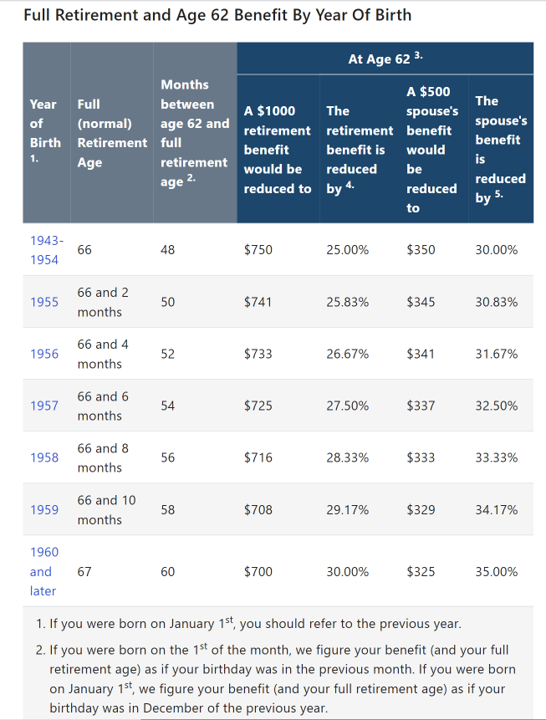What’s the best age to start taking Social Security? This is a very good question!
You have the option to take retirement benefits as early as age 62. However, s0-called “full” retirement benefits are payable at age 67. And, if you or delay collecting your retirement benefit until age 70, it will be for a higher monthly amount.
It amounts to an 8% “raise” every year you wait after your full retirement age, which varies by birth year. There is no incentive to delay claiming after age 70.
While it might seem like a bad deal to start taking benefits early remember, those who do are likely to collect checks for longer.
The government doesn’t actually reward you for starting Social Security payments early, on-time or late. It’s the same total estimated payment regardless of the time-frame you choose.
Really, the million-dollar question is how long will you live, and do you want a reduced amount for more years or higher amounts for fewer years.
The chart below, from the Social Security Administration, breaks it down in detail.

Besides your likely longevity, what also matters is your financial needs, current health condition, and if you enjoy working or not.
The best thing you can do to help you answer this question is to hire a certified financial planner (CFP) to have them put together a custom financial plan based on your current assets, liabilities, as well as needs, wants, and wishes.
He or she will have you fill out a detailed questionnaire so that they can better understand how you live today and how you want to live in the future.
Most advisors today use financial planning software because it provides sophisticated solutions and smart assumptions to help advisors navigate the complex financial elements of their clients’ lives.
Getting help
The main focus of these programs is around:
- Retirement planning
- Tax planning
- Retirement savings and income planning
- Estate planning
- Investment planning
To find a CFP near you, use the group’s official website. You can search by zip code.
The CFP certification is the standard of excellence in financial planning. CFP professionals are required to meet rigorous education, training, and ethical standards, and are committed to serving their clients’ best interests today to prepare them for a more secure tomorrow.
If you don’t want to pay for professional help or feel that your needs are simple, you can visit the Social Security Administration directly and learn more about retirement planning and the benefit credits you have accumulated over the years.
In any case, it helps to have a clear, written projection of your benefits and to understand the advantages and disadvantages of different claiming ages.


